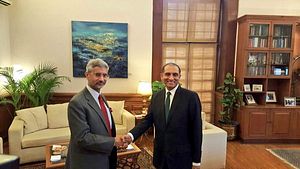Earlier this month, I discussed the unfortunate but not entirely surprising development in the India-Pakistan relationship when Islamabad’s envoy to New Delhi declared that pending peace talks between the two countries were suspended indefinitely. The comprehensive bilateral dialogue between the two countries was reignited at the end of 2015 with a spate of high-level diplomatic interactions, culminating in Indian Prime Minister Narendra Modi’s unannounced visit to Lahore on Christmas Day, on his way back to India from a trip to Afghanistan. January’s attack by Pakistan-based terrorists on the Indian Air Force’s base at Pathankot threw a wrench in the works, ultimately leading up to the suspension of talks.
This week, both sides decided to give diplomatic engagement another go, hoping to revive some of the momentum that had been lost in the first quarter of 2016 after a triumphant and optimistic end to 2015 with Modi’s Lahore visit. The top foreign policy bureaucrats from each country—Indian Foreign Secretary S. Jaishankar and his Pakistani counterpart Aizaz Ahmad Chaudhry—met in New Delhi. A meeting between the two men on the sidelines of the Heart of Asia conference on Afghanistan last fall got the ball rolling initially on the comprehensive bilateral dialogue.
Unfortunately, their latest attempt shows just how far back the bilateral has been reset in the aftermath of the Pathankot attacks. The botched visit of Pakistan’s joint investigation team, the capture of an alleged Indian spy in Pakistan, and broader bilateral mistrust colored the discussions between the two foreign secretaries. According to Vikas Swarup, a spokesperson for the Indian foreign ministry, Jaishankar continued to emphasize Indian concerns over the Pathankot attack investigation in Pakistan, the still-ongoing trial in the 2008 Mumbai attacks case, and the issue of listing Jaish-e-Mohammed chief Masood Azhar under UN Security Council resolution 1267. (India claims that JeM staged the Pathankot attack.)
Abdul Basit, Pakistan’s envoy to India, said that the two secretaries had discussed the Kashmir dispute, though it appears that little progress was made on that count as well. Chaudhry expressed strong concerns over Kulbhushan Yadav, an Indian national who was arrested in Pakistan for allegedly spying for India’s Research & Analysis Wing (RAW). He emphasized Pakistan’s serious concern about Indian involvement in Balochistan, echoing recent comments by Pakistan’s Chief of Army Staff General Raheel Sharif.

































